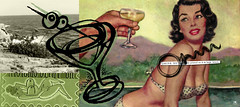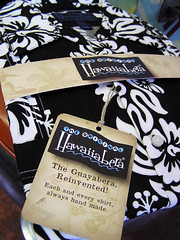Audio Journal 2004 (An Audio Tip Of The Glass to 2004)
Cool. You're reading this. And by now you've had a chance to listen to the latest CD I gave you over the Holidays.
Below is the track listing. It's a random little mix of some of the stuff I've been digging over this past year. It's all over the place including new stuff from The Deathray Davies, portastatic, Tommy Stinson, U2, De la Soul, some killer old Blues freshly converted to digital from old 78 lps, Los #3 Dinners, my Tiki Room Garage Band ditties, a bit of found audio from my stumbles around the globe and even some of my favorite NPR stories among other little audio gems. As always, please feel free to comment and if there's anything you think I need to hear - please pass it along! If you don't find what you're looking for, in terms of track info, please let me know via the comments button at the bottom of this here Blog.
Throw this in the next time you're in the mood for a little NPR/College Radio/What the Hell was that?/I Can't believe these guys are not winning Grammys! type stuff. Gonna be in the car for a while? This is a perfect Trip to Austin CD (via 281 from San Antonio) or better yet, the drive to Big Bend. Oh, and if this makes it to your iPod, try and keep the sequence of these 31 audio events for at least the first few listens. Not to say that this was an exercise in linear story telling, but in this instance the placement of each track was thoughtfully considered and purely a conscious effort. And by the way, leaving a comment assures your name on the list for the next installment due out early February, 2005. Yeah, it's like that.
If you could possibly manage the time, please, let me know if you've found anything on the disc that did anything to move your soul or at least get your toes tappin' or perhaps, maybe, at some point during your first few listens you found yourself suddenly singing along to a song that pretty much nobody else in the world (or your age group) has ever even heard of.
So...Turn it up there Captain!
1) Apollo Chatter Intro: 0:15 Space Transitions ©TBR Segue
2) Ice Cold Lemonade 1:39 Lost EP Death By Chocolate
3) NYKRIS Leicester Square Gentlemans Room 0:45 NYKRIS pPod
4) Drinkin Shine 3:11 78s Elder Curry
5) The Tarpon Inn 2:45 http://music.download.com/tikibongo Tiki Bongo
6) Down In SA 2:42 Live From KSYM Los #3 Dinners
7) Paris Welcome 0:25 Paris Fun Facts NYT.com
8) In Spain 5:11 From The Back Of Eric's Trunk Buttercup
9) Autumn Got Dark 2:48 Autumn Was A Lark Portastatic
10) Bit Torrents 3:33 Paul Ford NPR
11) Open House 3:32 The Horrible Truth About Moped Moped
12) Letter To God 3:00 New 2004 The Deathray Davies
13) All Because Of You 3:39 How To Dismantle An Atomic Bomb U2
14) Hey You 5:23 Village Gorilla Head Tommy Stinson
15) Apollo Chatter Hey John: 0:15 Space Transitions ©TBR Segue
16) Plan To Stay Awake 2:03 New 2004 The Deathray Davies
17) Harry Potter 2:09 Harry Potter Harry Potter
18) Early 4:12 H. Michael Karshis's Album H. Michael Karshis
19) Butts Outa Bed 0:06 My Darling Wife 2B Audio Sketch Book HMK
20) Necessito 2:54 Some Girls Some Girls
21) Don't Fuck With My Friends 3:55 New 2004 The Deathray Davies
22) Nice Airport 10/4/04 2:17 PM 0:38 Found Sound HMK
23) Up 'n' Down 2 1:48 H. Michael Karshis's Album H. Michael Karshis
24) Cutting Daisies 5:19 From The Back Of Eric's Trunk Buttercup
25) Paris Metro 1:32 Paris Fun Facts NYT
26) Vertigo 3:14 How To Dismantle An Atomic Bomb U2
27) Paris Shopping 1:37 Paris Fun Facts NYT.com
28) Shoppin' Bags 3:57 The Grind Date De la Soul
29) Rockin & Rollin 1:03 78s Lil Son Jackson
30) Tiki Review 001 1:07 Bill, Bud & Ed's Excellent Adventure Found Sound HMK
31) What About Mine? 3:43 Folker Paul Westerberg
32) Apollo Chatter Cards & Letters: 0:15 Space Transitions ©TBR Segue
Peace My Friends,
HMK
HAVE YOURSELF A MERRY LITTLE CHRISTMAS
Let your heart be light
From now on our troubles will be out of sight
Have yourself a merry little Christmas
Make the Yule-tide gay
From now on our troubles will be miles away
Here we are as in olden days
Happy golden days of yore
Faithful friends who are dear to us
Gather near to us once more
Through the years
We all will be together
If the Fates allow
Hang a shining star upon the highest bough
And have yourself
A merry little Christmas now
- Written by Hugh Martin & Ralph Blane, 1943
"I will honour Christmas in my heart, and try to keep it all the year.
I will live in the Past, the Present, and the Future. The Spirits of
all Three shall strive within me. I will not shut out the
lessons that they teach."
- Charles Dickens, A Christmas Carol, 1843


















